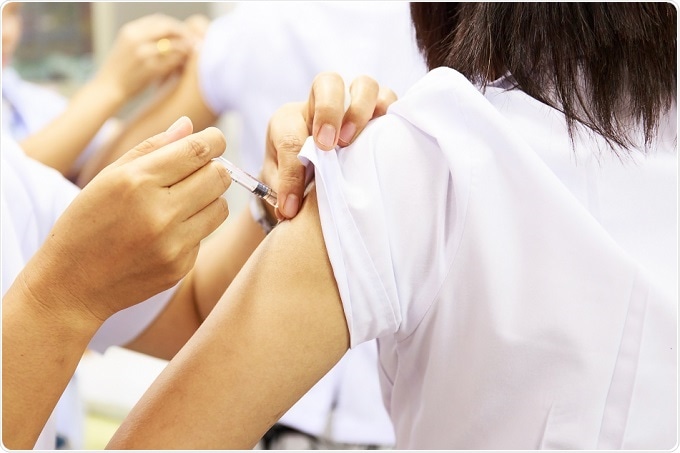A US national survey reports that even children who have had cancer previously, and are therefore at increased risk of developing further cancers, are not receiving vaccination against human papillomavirus (HPV).

Credit: Komsan Loonprom/Shutterstock.com
HPV is a large group of viruses that live on the skin and moist membranes lining the body, some of which specifically affect the genital area. Genital HPV is highly contagious and is the most common sexually transmitted infection in the United States. Estimations made by The US Centers for Disease Control and Prevention indicate that 80‑90% of sexually active adults in the US will contract HPV during their lifetime.
Although most HPV infections are asymptomatic and clear spontaneously, some higher risk HPV strains can cause cancer.
A vaccine is available that protects against the strains of HPV that cause cervical cancer. Routine HPV vaccination is recommended for both male and female teenagers and for childhood cancer survivors. However, uptake rates for the vaccination are low.
St. Jude Children's Research Hospital and the University of Alabama at Birmingham have just completed the first comprehensive national survey of HPV vaccination rates. It included 982 patients who had completed pediatric cancer treatment between one and five years ago.
They report that, despite being at higher risk of developing HPV-related cancers, uptake of the HPV vaccine among children who have survived cancer was lower than the national average.
It is recommended that childhood cancer survivors receive three doses of the HPV vaccine. This had been achieved in only 14% of the 13- to 26-year-olds surveyed. At least one of the three vaccinations had been received by 24% of participants. In contrast, the comparable rates among the general US population are 21% and 41%, respectively.
The HPV vaccine is an important tool to help us keep our kids safe because it significantly lowers the risk of HPV-associated cancers in the future...we were concerned to find vaccination rates were significantly lower for survivors of childhood cancer compared to their peers."
James Klosky, an associate member of the St. Jude Department of Psychology
The survey also revealed that the HPV vaccination was most likely to be received if it was recommended by a health care provider. Only 5% of childhood cancer survivors who had not received a recommendation from their healthcare professional had been vaccinated against HPV, compared with over half of those to whom the vaccine had been recommended.
Worryingly, less than a quarter of parents of childhood cancer survivors said the HPV vaccine had been recommended to them. For the remaining three quarters of children with a history of cancer there was just a 1-in-20 chance that they were vaccinated against HPV.
This highlights the importance of encouraging physicians to recommend the vaccine in order to improve uptake of the HPV vaccine. Strategies are being developed to ensure that physicians, advance practice nurses and other health care providers never miss an opportunity to recommend the HPV vaccine to eligible patients and their parents.
Wendy Landier of the Institute for Cancer Outcomes and Survivorship at the University of Alabama at Birmingham (UAB) commented "We know that provider recommendation is a key predictor of HPV vaccination...clear communication between health care providers is essential to ensure survivors receive the vaccine that can protect them against HPV-related cancers."